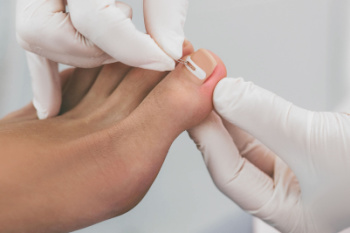6650 Frankford Ave
Philadelphia, PA 19135

Ingrown toenails occur when the nails grow into the surrounding skin, leading to pain, redness, and possible infection. While mild cases of ingrown toenails can sometimes improve on their own, more severe or persistent cases often require medical care. A podiatrist can assess the severity of the ingrown toenail and offer specific treatment options. In advanced cases, minor surgical procedures, such as partial or total nail removal, may be necessary to alleviate pain and prevent recurrence. Ingrown toenails that become infected may also be treated with antibiotics, if needed. Early intervention can reduce the likelihood of such complications, especially for patients with diabetes or circulation issues. Regular care from a podiatrist, such as learning how to correctly trim nails and wearing shoes that fit properly, can also help. If you have a painful ingrown toenail, it is suggested that you schedule an appointment with a podiatrist for an exam and treatment.
Ingrown toenails can become painful if they are not treated properly. For more information about ingrown toenails, contact John M. Fanelly, DPM of Northeast Philadelphia. Our doctor can provide the care you need to keep you pain-free and on your feet.
Ingrown Toenails
Ingrown toenails occur when a toenail grows sideways into the bed of the nail, causing pain, swelling, and possibly infection.
Causes
Prevention
Because ingrown toenails are not something found outside of shoe-wearing cultures, going barefoot as often as possible will decrease the likeliness of developing ingrown toenails. Wearing proper fitting shoes and using proper cutting techniques will also help decrease your risk of developing ingrown toenails.
Treatment
Ingrown toenails are a very treatable foot condition. In minor cases, soaking the affected area in salt or antibacterial soaps will not only help with the ingrown nail itself, but also help prevent any infections from occurring. In more severe cases, surgery is an option. In either case, speaking to your podiatrist about this condition will help you get a better understanding of specific treatment options that are right for you.
If you have any questions please feel free to contact our office located in Philadelphia, PA . We offer the newest diagnostic and treatment technologies for all your foot and ankle needs.